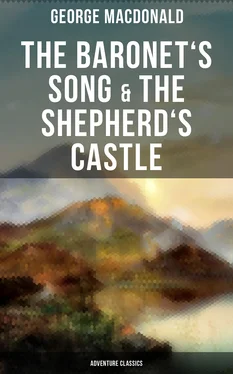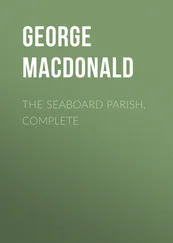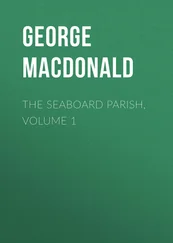Ginevra was hardly the same child after the experience of that terrible morning. At no time very much at home with her father, something had now come between them, to remove which all her struggles to love him as before were unavailing. The father was too stupid, too unsympathetic, to take note of the look of fear that crossed her face if ever he addressed her suddenly; and when she was absorbed in fighting the thoughts that would come, he took her constraint for sullenness.
With a cold spot in his heart where once had dwelt some genuine regard for Donal, Fergus went back to college. Donal went on herding the cattle, cudgeling Hornie, and reading what books he could lay his hands on: there was no supply through Fergus any more, alas! The year before, ere he took his leave, he had been careful to see Donal provided with at least books for study; but this time he left him to shift for himself. He was small because he was proud, spiteful because he was conceited. He would let Donal know what it was to have lost his favour! But Donal did not suffer much, except in the loss of the friendship itself. He managed to get the loan of a copy of Burns—better meat for a strong spirit than the poetry of Byron or even Scott. An innate cleanliness of soul rendered the occasional coarseness to him harmless, and the mighty torrent of the man's life, broken by occasional pools reflecting the stars; its headlong hatred of hypocrisy and false religion; its generosity, and struggling conscientiousness; its failures and its repentances, roused much in the heart of Donal. Happily the copy he had borrowed, had in it a tolerable biography; and that, read along with the man's work, enabled him, young as he was, to see something of where and how he had failed, and to shadow out to himself, not altogether vaguely, the perils to which the greatest must be exposed who cannot rule his own spirit, but, like a mere child, reels from one mood into another—at the will of—what?
From reading Burns, Donal learned also not a little of the capabilities of his own language; for, Celt as he was by birth and country and mental character, he could not speak the Gaelic: that language, soft as the speech of streams from rugged mountains, and wild as that of the wind in the tops of fir-trees, the language at once of bards and fighting men, had so far ebbed from the region, lingering only here and there in the hollow pools of old memories, that Donal had never learned it; and the lowland Scotch, an ancient branch of English, dry and gnarled, but still flourishing in its old age, had become instead, his mother-tongue; and the man who loves the antique speech, or even the mere patois, of his childhood, and knows how to use it, possesses therein a certain kind of power over the hearts of men, which the most refined and perfect of languages cannot give, inasmuch as it has travelled farther from the original sources of laughter and tears. But the old Scotish itself is, alas! rapidly vanishing before a poor, shabby imitation of modern English—itself a weaker language in sound, however enriched in words, since the days of Shakspere, when it was far more like Scotch in its utterance than it is now.
My mother-tongue, how sweet thy tone! How near to good allied! Were even my heart of steel or stone, Thou wouldst drive out the pride.
So sings Klaus Groth, in and concerning his own Plattdeutsch—so nearly akin to the English.
To a poet especially is it an inestimable advantage to be able to employ such a language for his purposes. Not only was it the speech of his childhood, when he saw everything with fresh, true eyes, but it is itself a child-speech; and the child way of saying must always lie nearer the child way of seeing, which is the poetic way. Therefore, as the poetic faculty was now slowly asserting itself in Donal, it was of vast importance that he should know what the genius of Scotland had been able to do with his homely mother-tongue, for through that tongue alone, could what poetry he had in him have thoroughly fair play, and in turn do its best towards his development—which is the first and greatest use of poetry. It is a ruinous misjudgment—too contemptible to be asserted, but not too contemptible to be acted upon, that the end of poetry is publication. Its true end is to help first the man who makes it along the path to the truth: help for other people may or may not be in it; that, if it become a question at all, must be an after one. To the man who has it, the gift is invaluable; and, in proportion as it helps him to be a better man, it is of value to the whole world; but it may, in itself, be so nearly worthless, that the publishing of it would be more for harm than good. Ask any one who has had to perform the unenviable duty of editor to a magazine: he will corroborate what I say—that the quantity of verse good enough to be its own reward, but without the smallest claim to be uttered to the world, is enormous.
Not yet, however, had Donal written a single stanza. A line, or at most two, would now and then come into his head with a buzz, like a wandering honey-bee that had mistaken its hive—generally in the shape of a humorous malediction on Hornie—but that was all.
In the mean time Gibbie slept and waked and slept again, night after night—with the loveliest days between, at the cottage on Glashgar. The morning after his arrival, the first thing he was aware of was Janet's face beaming over him, with a look in its eyes more like worship then benevolence. Her husband was gone, and she was about to milk the cow, and was anxious lest, while she was away, he should disappear as before. But the light that rushed into his eyes was in full response to that which kindled the light in hers, and her misgiving vanished; he could not love her like that and leave her. She gave him his breakfast of porridge and milk, and went to her cow.
When she came back, she found everything tidy in the cottage, the floor swept, every dish washed and set aside; and Gibbie was examining an old shoe of Robert's, to see whether he could not mend it. Janet, having therefore leisure, proceeded at once with joy to the construction of a garment she had been devising for him. The design was simple, and its execution easy. Taking a blue winsey petticoat of her own, drawing it in round his waist, and tying it over the chemise which was his only garment, she found, as she had expected, that its hem reached his feet: she partly divided it up the middle, before and behind, and had but to backstitch two short seams, and there was a pair of sailor-like trousers, as tidy as comfortable! Gibbie was delighted with them. True, they had no pockets, but then he had nothing to put in pockets, and one might come to think of that as an advantage. Gibbie indeed had never had pockets, for the pockets of the garments he had had were always worn out before they reached him. Then Janet thought about a cap; but considering him a moment critically, and seeing how his hair stood out like thatch-eaves round his head, she concluded with herself "There maun be some men as weel's women fowk, I'm thinkin', whause hair's gien them for a coverin'," and betook herself instead to her New Testament.
Gibbie stood by as she read in silence, gazing with delight, for he thought it must be a book of ballads like Donal's that she was reading. But Janet found his presence, his unresting attitude, and his gaze, discomposing. To worship freely, one must be alone, or else with fellow-worshippers. And reading and worshipping were often so mingled with Janet, as to form but one mental consciousness. She looked up therefore from her book, and said—
"Can ye read, laddie?"
Gibbie shook his head.
"Sit ye doon than, an' I s' read till ye."
Gibbie obeyed more than willingly, expecting to hear some ancient Scots tale of love or chivalry. Instead, it was one of those love-awful, glory-sad chapters in the end of the Gospel of John, over which hangs the darkest cloud of human sorrow, shot through and through with the radiance of light eternal, essential, invincible. Whether it was the uncertain response to Janet's tone merely, or to truth too loud to be heard, save as a thrill, of some chord in his own spirit, having its one end indeed twisted around an earthly peg, but the other looped to a tail-piece far in the unknown—I cannot tell; it may have been that the name now and then recurring brought to his mind the last words of poor Sambo; anyhow, when Janet looked up, she saw the tears rolling down the child's face. At the same time, from the expression of his countenance, she judged that his understanding had grasped nothing. She turned therefore to the parable of the prodigal son, and read it. Even that had not a few words and phrases unknown to Gibbie, but he did not fail to catch the drift of the perfect story. For had not Gibbie himself had a father, to whose bosom he went home every night? Let but love be the interpreter, and what most wretched type will not serve the turn for the carriage of profoundest truth! The prodigal's lowest degradation, Gibbie did not understand; but Janet saw the expression of the boy's face alter with every tone of the tale, through all the gamut between the swine's trough and the arms of the father. Then at last he burst—not into tears—Gibbie was not much acquainted with weeping—but into a laugh of loud triumph. He clapped his hands, and in a shiver of ecstasy, stood like a stork upon one leg, as if so much of him was all that could be spared for this lower world, and screwed himself together.
Читать дальше












